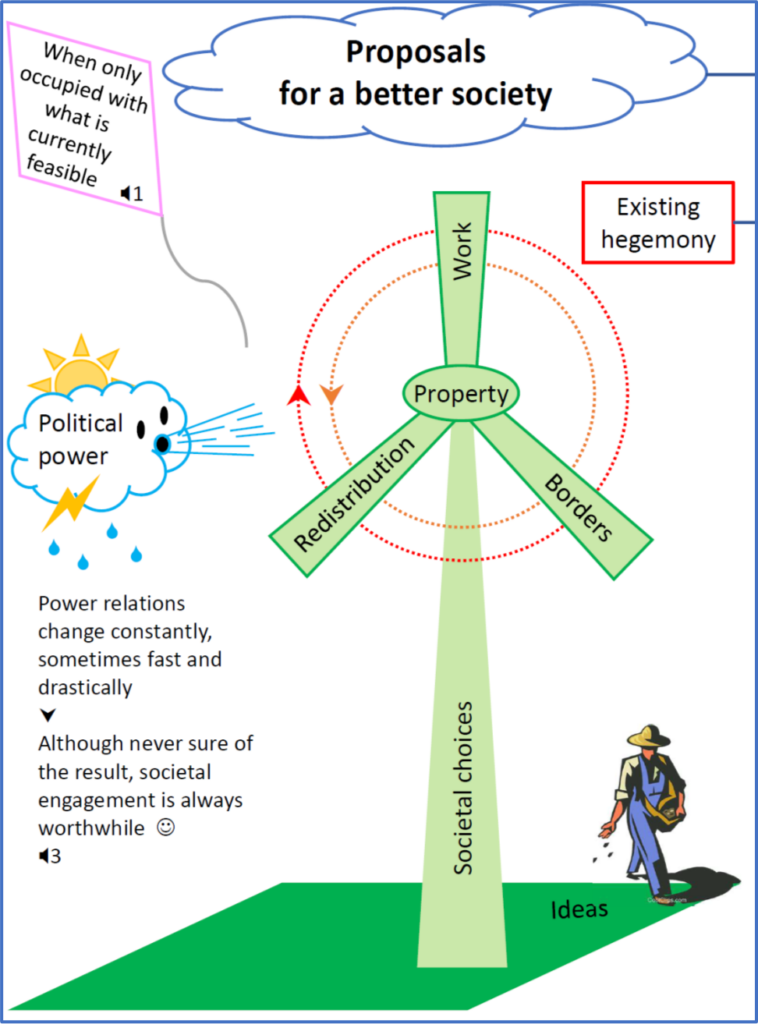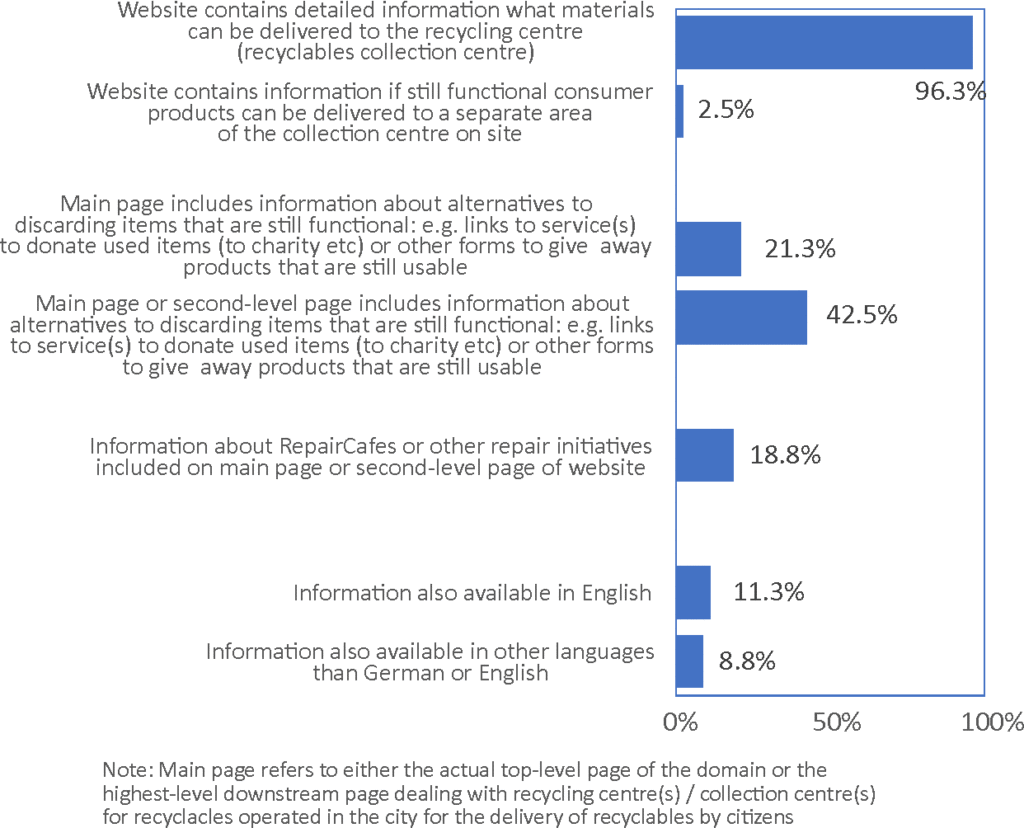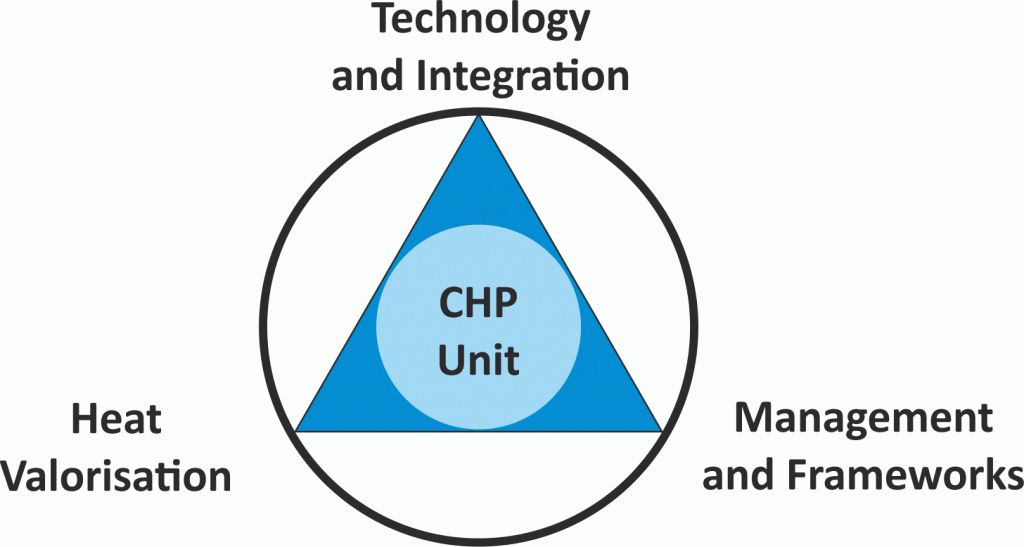Keeping in view the society we wish for – Reflections by Nele Schmitz and proposals for a more sustainable society, inspired by the book of Thomas Decreus and Christophe Callewaert

Read more here:
We conducted a web-based analysis of the websites dedicated to informing the citizen about the private delivery of recyclables to the local recyclables collection centre (recycling centre) in Germany. All cities in Germany with a population of more than 100,000 inhabitants were considered (80 cities in total). Clarity of information regarding the types of materials which can be delivered by the private household to the recycling centre was assessed. Furthermore, it was analysed whether the website pro-actively encouraged higher forms of circular economy practices such as re-use and repair practices, which according to the waste management hierarchy are options of priority compared to recycling because they keep the materials at higher value in the economy. Most websites, namely 96%, contained detailed information about the materials which can be delivered by the citizen to the recycling centre. Around 10% of websites also informed in at least one language other than German, a valuable service to individuals with a background of migration. However, most websites missed the opportunity to point out the existence of alternatives to discarding valuable items as waste at the recycling centre. 43% of websites provided information about alternatives to discarding still functional products, such as links to services to donate such items to charity organisations. 19% of websites included information about RepairCafes or other local repair initiatives, thus pro-actively informing the visitor of the website about this option. The results of the study show that the German recycling centre websites fulfil their main purpose of informing the citizen whether a specific item can be delivered to the site, but the websites largely miss the opportunity to pro-actively encourage circular economy practices which sit at higher levels of the waste management hierarchy.

Publication:
Kusch-Brandt, S.: Websites informing the citizen in Germany about the local recycling centre: a survey under a circular economy perspective. Proceeding “20th International Multidisciplinary Scientific Geoconference SGEM 2020”, Energy and Clean Technologies, vol. 4.1, Sofia, pp. 281-286.
Moving towards sustainable food value chains is one of the greatest and most complex challenges of our time. A Special Issue of the International Journal of Environmental Research and Public Health explores promising solutions and specific problems in this context. It becomes evident that there is still an incomplete picture regarding how innovations in the food system can be strengthened to catalyse transformations at a larger scale. Grassroot initiatives require more supporting efforts to effectively influence policies, and the lack of coordination among civil society initiates must be overcome. Sustainability-oriented companies in food supply chains also have a major role to play.
Link to website containing all publications of the Special Issue:
Towards More Sustainable Food Systems
Thank you to all contributors!
An important opportunity for more sustainable development pathways in an urbanising world is missed where resources remain underutilised, when they could be valorised in a sound and environmentally favourable mode. A Special Issue with the journal Resources identified promising solutions and specific challenges in the context of underutilised resources in urban environments.
Link to the collection of publications: Underutilised Resources in Urban Environments
(A printed book version is also available.)
Thank you to all contributors!
Timber is a natural resource that is all around us in the form of solid wood, fibreboard or veneer in constructions, furniture, decorations, … or as pulp and paper products, or in summer times as charcoal on the BBQ. Sustainable use of timber starts with legal use of timber. Illegal logging doesn’t respect management plans, (inter)national regulations, or people’s needs. Therefore, the Global Timber Tracking Network was started in 2012 as a network of stakeholders involved in timber research, industry or governance. The aim of the GTTN is to operationalise timber tracking tools to help implement the current regulations concerning the trade in timber (for the EU that is the EUTR).
Timber tracking based on the inherent wood characteristics is the only way to be sure that wood or a wood product at the end of the supply chain is what the documents say it is, and is hence legal. There are currently 6 different timber tracking methods that can reveal species and/or geographic identity. Depending on the exact identification question, one method will be more suitable than the other. Therefore, an infogram was developed to give an overview of the current capacities of the different timber tracking tools. The guide links to a list of all experts in timber tracking, currently know of in the world.
The infographic of timber tracking tools creates the perfect base to discuss the gaps and opportunities for further developments in the field of wood identification. Two critical parts of the wood identification process, open for more advancements are the collection of reference samples and the data analysis. With global timber supply chains there is a need for harmonization of procedures to secure the reputation of the different wood identification tools and to facilitate collaborations. Also, a common language is essential for any collaboration and hence for further innovations. Therefore, it is important to investigate the current barriers of information flow and to evaluate how much information we miss if we only consider English language literature.
Website Global Timber Tracking Network: https://globaltimbertrackingnetwork.org/
For further information please contact Dr. Nele Schmitz:
nele.schmitz(at)thuenen.de
nele.schmitz(at)scensers.org
Technologies to implement cogeneration (or combined heat and power production (CHP)) to deliver both electricity and heat simultaneously are state of the art, but 70% (European Union) to 80% (worldwide) of the existing potential remains untapped. Challenges for more widespread adoption of decentralised CHP installations fall into three identified dimensions [1]:

References
[1] Kusch-Brandt, Sigrid: Common challenges in the implementation of decentralized combined heat and power production. Proceedings 18th International Multidisciplinary Scientific Geoconference SGEM 2018, Vol. 18, Energy and Clean Technologies, Issue 4.1, 2018, pp. 219-226
The publication is available here (pdf):
Common challenges in the implementation of decentralized combined heat and power production
Significant quantities of valuable resources are embodied in Qatar’s wastewater, with potential to be recovered, explores the study of Alsheyab and Kusch-Brandt based on a mass flow analysis [1]. The proposed concept of a wastewater refinery combines wastewater treatment with advanced resource recovery [1]. In this concept, wastewater management is no longer mainly focused on achieving environmentally clean or “fit for purpose” treated wastewater, but instead aims to also generate value-added products. The study concludes that valorisation of organic constituents and the recovery of nitrogen, phosphorus, and sulfide should be given priority.
References
[1] Alsheyab, M.A.T.; Kusch-Brandt, S. Potential Recovery Assessment of the Embodied Resources in Qatar’s Wastewater. Sustainability 2018, 10, 3055. doi: 10.3390/su10093055
The publication in the journal Sustainability is available open access here:
Potential Recovery Assessment of the Embodied Resources in Qatar’s Wastewater
More renewables in the energy mix worldwide! Renewable power, in particular, continued to rapidly grow in the last year, and overall accounted for 70% of net additions to global power generating capacity in 2017. However, heating, cooling and transport fuel together account for about four fifths of global final energy demand; but they continue to lag far behind the power sector with view to more widespread implementation of renewables.
The 2018 GSR, as comprehensive annual overview of the state of renewable energy worldwide, is available here on the website of REN21 (Renewable Energy Policy Network for the 21st Century):
REN21 Renewables 2018 Global Status Report
The 2017 edition of the REN21 Renewables Global Status Report, launched in June 2017 to provide a comprehensive annual overview of the state of renewable energy, reveals that 2016 was another extraordinary year for renewable energy.
As of 2015, renewable energy provided 19.3% of global final energy consumption, of which 9.1% were traditional biomass and 10.2% modern renewables.
In the power sector, solar photovoltaics (47% of newly installed renewable power capacity in 2016) and wind (34% of newly installed renewable power capacity) were the most dynamic areas. Overall, by end of 2016, renewables covered 24.5% of global electricity demand.
2016 was the third year in a row where decoupling of economic growth and energy-related CO2 emissions occurred.
Despite good performance of renewables and significant advancement in the global renewable energy transition, further and faster progress is required. Some areas:
The full report is available on the REN21 website:
Renewables 2017 Global Status Report (GSR)
Assessment of WEEE (waste electrical and electronic equipment) generation against the gross domestic product (GDP) data from 50 countries of the pan-European region reveals a very high economic elasticity, indicating that WEEE and GDP are closely interlinked, regardless of the economic developmental stage of individual countries. In this context, GDP at purchasing power parity (GDP PPP) is a more meaningful measure. In the pan-European region, an increase of 1000 international $ GDP PPP means an additional 0.5 kg WEEE is generated that requires management.
Read the full publication here (open access)
(Kusch, Sigrid; Hills, Colin D.: The link between e-waste and GDP – new insights from data from the pan-European region. Resources 6 (2), 2017, 16)